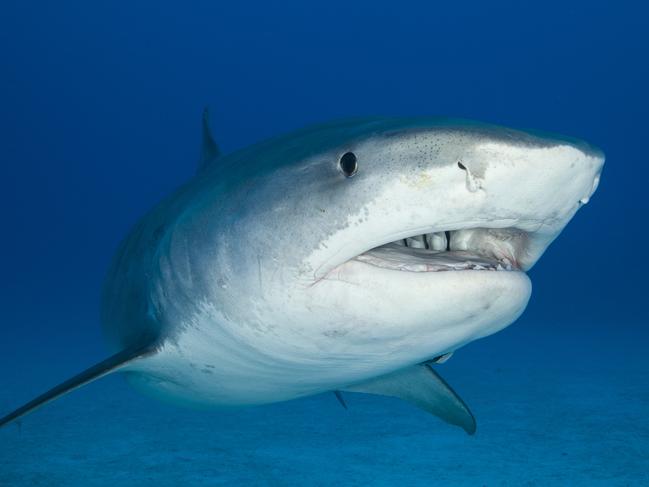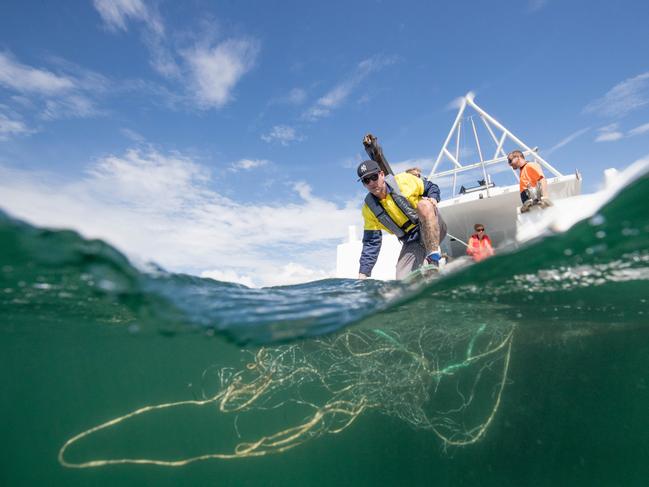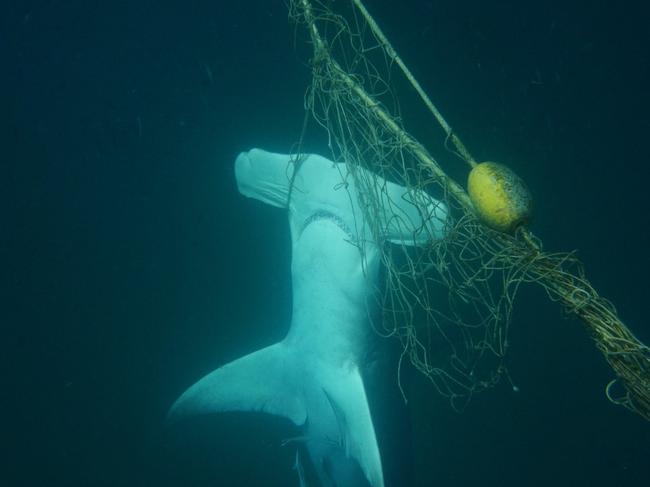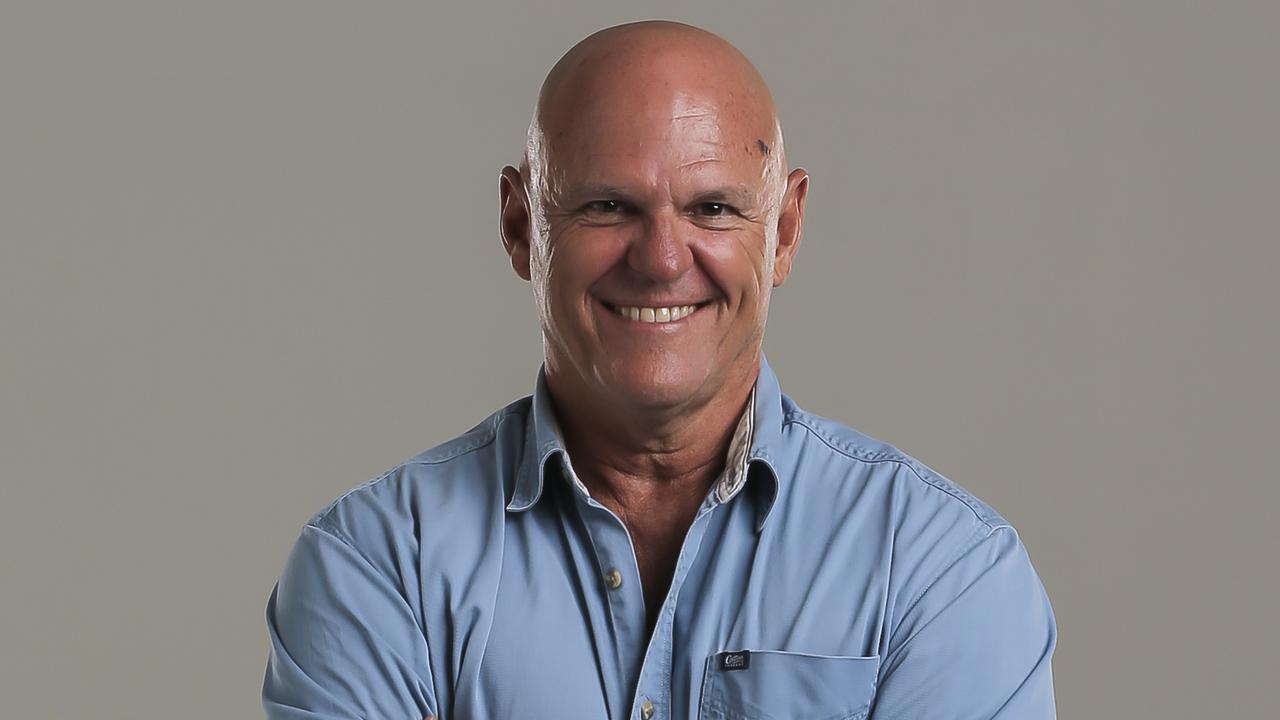Tangled debate over shark nets
SEA World’s Trevor Long calls them “indiscriminate killers”. But they’re life-savers as far as many surfers, swimmers and divers are concerned. WHERE DO YOU STAND ON THE SHARK NET DEBATE?
Opinion
Don't miss out on the headlines from Opinion. Followed categories will be added to My News.
SEA World’s Trevor Long calls them “indiscriminate killers”. But they’re life-savers as far as many surfers, swimmers and divers are concerned.
Shark nets have long divided the public, just as they have successfully separated man from man-eaters, if you listen to supporters. Opponents, however, point out that as well as catching sharks, the nets and baited drumlines also trap and kill whales, dolphins, turtles, dugongs and other harmless marine creatures.
SCROLL DOWN TO TAKE OUR POLL AND THEN HAVE YOUR SAY IN THE COMMENTS SECTION BELOW
The shark-net debate invariably flares every year during the East Coast’s annual whale migration, which occurs between May and November. Rarely a whale season goes by without strandings of humpbacks in the nets, especially off the Gold Coast, and whale rescuers including Long are forced to put to sea on dangerous missions to free the tangled giants of the deep.
“These shark nets are indiscriminate killers, there’s whales, dolphins, turtles, dugongs – a whole range of animals caught,” Long says after a young humpback recently had to be rescued when it became tangled in the nets off Burleigh Heads.

“They’ve got a fear of drowning, just like we have. They don’t understand the situation, they just want to escape the net.”
There has been only one deadly shark attack on Queensland beaches since nets were introduced in 1962 following a series of fatalities. The State Government’s Shark Control Program consists of more than 30 nets and 330 drumlines staggered along the coastline from Coolangatta to Cairns.
The nets are about 190m long and half a metre deep and are anchored to the seabed 500m off more than 80 of the state’s most popular beaches.
Last year, the nets and drumlines snared 510 sharks, including great whites. The haul included a monster 4m tiger shark, caught off Ellis Beach in Cairns.
But the anti-shark gear also caught more than 130 “non-targeted” creatures, including eight humpbacks, 19 turtles and two dolphins. Almost 60 of the creatures died.
“The entrapment situation of whales in shark nets along the Queensland coast is going to be problematic,” Long says. “We’ve got over 30,000 whales passing our coast this year, and it’s still increasing by 10 per cent. So from this point on, we will see more animals trapped.”
Marine conservation groups such as Sea Shepherd have joined Long in campaigning for the nets to be removed altogether, or at least pulled up during the whale migration as happens in NSW. In late 2016, after 13 shark attacks on northern NSW beaches in two years, including a spate of horrific fatalities that severely damaged tourism, a shark-net trial was launched there despite outcry from environmentalists. Other measures were also introduced, including shark-spotting drones and “smart” drumlines, which signal Department of Primary Industries officials when sharks are caught and allow them to be tagged and relocated.

NSW North Coast beaches have been attack free since the trial began. A second trial ended in May and the program is now being assessed by the NSW Government ahead of summer.
Phil Myers, a Ballina surfboard manufacturer who has been surfing the area since 1963, says he’s seen a lot of sharks over the years “but never as many as I’ve seen in the last 15 years”. They have included a great white “as big as a bloody speedboat” ploughing through the water near him as he bobbed on his board.
“Something had to be done,” Myers says. “Thirteen attacks in two years was unacceptable. Lives and livelihoods were being lost. The greenies accused us of being emotional because our friends were getting eaten, but the fact is that the attacks have suddenly stopped (since the nets and drumlines went in). Everyone feels a bit more comfortable in the water down here”
But Terry “Tappa” Teece, a veteran Gold Coast surfer and surf reporter, says many Queensland boardriders are still spooked by the attacks that happened around Ballina and Byron Bay in 2015/16, and are wary of venturing south for a wave.
“You’re never going to get me to surf North Wall Ballina (the northern breakwater of the Ballina River) or South Wall Ballina,” says Teece, who regularly surfed the area before the attacks.
“A lot of Gold Coast surfers are still reluctant to head down that way, even though the waves are almost always bigger, better and less crowded. If you do, it’s hard to have a comfortable surf because even though you probably won’t get attacked, it’s spinning around in your mind the whole time.”

Local boardriding club MNM (Mermaid-Nobbys-Miami), of which Teece is a former president, used to take its junior members to Flat Rock campground at Ballina every August for the Gold Coast show holiday long weekend but they abandoned the spot after all the attacks. “They go to North Straddie, now – it’s all about duty of care,” Teece says. “You can’t take 100 junior surfers down there and risk one of them being attacked by a shark.”
After the NSW net trial began, a Greens/Labor- dominated Senate committee launched an inquiry into shark-control measures. Late last year, it made its recommendations, including an end to “lethal” shark nets and drumlines in Queensland and NSW.
“After conducting this inquiry, the committee is concerned that a heightened fear of sharks has led to responses that may calm the public and appear to provide an effective response, but which are not verified by scientific evidence,” the report said.
“Although the effectiveness of lethal shark control measures for public safety is difficult to evaluate, the significant damage to the marine environment these measures cause by killing many non-dangerous species of sharks and other marine species is clear.”
But in Queensland, the nets and drumlines are unlikely to be pulled up any time soon. A Queensland Government submission to the Senate inquiry said emerging shark deterrents such as electronic barriers are yet to be proven and the “current evidence indicates traditional capture methods remain the most effective measures to reduce the risk of shark attack”.
“If Queensland did not maintain a shark-control program there would be increased shark activity at popular beaches and possible fatalities with resultant tourist-booking cancellations and other negative economic impacts,” the Government said.
Its position was echoed by Surf Life Saving Queensland boss George Hill, who warned that meddling with shark nets would dangerously compromise beach safety.


